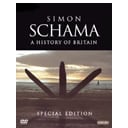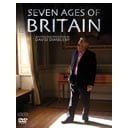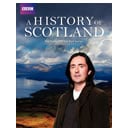A History of Britain
 Stretching from the Stone Age to the year 2000, Simon Schama's Complete History of Britain does not pretend to be a definitive chronicle of the turbulent events which buffeted and shaped the British Isles.
Stretching from the Stone Age to the year 2000, Simon Schama's Complete History of Britain does not pretend to be a definitive chronicle of the turbulent events which buffeted and shaped the British Isles.
What Schama does do, however, is tell the story in vivid and gripping narrative terms, free of the fustiness of traditional academe, personalizing key historical events by examining the major characters at the center of them.
Not all historians would approve of the history depicted here as shaped principally by the actions of great men and women rather than by more abstract developments, but Schama's way of telling it is a good deal more enthralling as a result.
A study of the history of the British Isles, each of the 15 episodes allows Schama to examine a particular period and tell of its events in his own style.
1. Beginnings: 3100 BC – 1000 AD. Simon Schama starts his story in the stone age village of Skara Brae, Orkney. Over the next four thousand years Romans, Anglo-Saxons, Vikings, Danes, and Christian missionaries arrive, fight, settle and leave their mark on what will become the nations of Britain.
2. Conquest: 1000–1087. 1066 is not the best remembered date in British history for nothing. In the space of nine hours whilst the Battle of Hastings raged, everything changed. Anglo-Saxon England became Norman and, for the next 300 years, its fate was decided by dynasties of Norman rulers.
3. Dynasty: 1087–1216. There is no saga more powerful than that of the warring dynasty – domineering father, beautiful, scheming mother and squabbling, murderous sons and daughters, (particularly the nieces). In the years that followed the Norman Conquest, this was the drama played out on the stage of British history.
4. Nations: 1216–1348, this is the epic account of how the nations of Britain emerged from under the hammer of England's "Longshanks" King Edward I, with a sense of who and what they were, which endures to this day.
5. King death: 1348–1500. It took only six years for the plague to ravage the British Isles. Its impact was to last for generations. But from the ashes of this trauma an unexpected and unique class of Englishmen emerged.
6. Burning convictions: 1500–1558. Here Simon Schama charts the upheaval caused as a country renowned for its piety, whose king styled himself Defender of the Faith, turns into one of the most aggressive proponents of the new Protestant faith.
7. The body of the Queen: 1558–1603. This is the story of two queens: Elizabeth I of England, the consummate politician, and Mary I, Queen of Scots, the Catholic mother. It is also the story of the birth of a nation.
8. The British wars: 1603–1649. The turbulent civil wars of the early seventeenth century would culminate in two events unique to British history; the public execution of a king and the creation of a republic. Schama tells of the brutal war that tore the country in half and created a new Britain – divided by politics and religion and dominated by the first truly modern army, fighting for ideology, not individual leaders.
9. Revolutions: 1649–1689. Political and religious revolutions racked Britain after Charles I's execution, when Britain was a joyless, kingless republic led by Oliver Cromwell. His rule became so unpopular that for many it was a relief when the monarchy was restored after his death, but Cromwell was also a man of vision who brought about significant reforms.
10. Britannia incorporated: 1690–1750. As the new century dawned, relations between Scotland and England had never been worse. Yet half a century later the two countries would be making a future together based on profit and interest. The new Britain was based on money, not God.
11. The wrong empire: 1750–1800. The series is the exhilarating and terrible story of how the British Empire came into being through its early settlements—the Caribbean through the sugar plantations (and helped by slavery), the land that later became the United States and India through the British East India Company - and how it eventually came to dominate the world. A story of exploration and daring, but also one of exploitation, conflict, and loss.
12. Forces of nature: 1780–1832. Britain never had the kind of revolution experienced by France in 1789, but it did come close. In the mid-1770s the country was intoxicated by a great surge of political energy. Re-discovering England's wildernesses, the intellectuals of the "romantic generation" also discovered the plight of the common man, turning nature into a revolutionary force.
13. Victoria and her sisters: 1830–1910. As the Victorian era began, the massive advance of technology and industrialisation was rapidly reshaping both the landscape and the social structure of the whole country. To a much greater extent than ever before women would take a center-stage role in shaping society.
14. The empire of good intentions: 1830–1925. This episode charts the chequered life of the liberal empire from Ireland to India – the promise of civilisation and material betterment and the delivery of coercion and famine.
15. The two Winstons": 1910–1965. In the final episode, Schama examines the overwhelming presence of the past in the British twentieth century and the struggle of leaders to find a way to make a different national future. As towering figures of the twentieth century, Churchill and Orwell (through his 1984 character Winston Smith) in their different ways exemplify lives spent brooding and acting on that imperial past, and most movingly for us, writing and shaping its history.




Any one with a love of history will have to put this on the list of programs to watch. It draws you in and the narrative carries you along effortlessly.
What a drag this documentary was. Very poor video quality, repeated sequences, and that sound - hard to take. The man has a terrible diction, I did not understand 20-30% of what he said - did he speak English? War and fight events cheaply choreographed. Inadequately and poorly relayed horror and tragedy of some important historical facts. Why all these texts in Latin and olde English? I couldn't read them anyway. Monotonous, boring, and way too long. I forced myself to view the entire parade just to have an opinion. Give us a more lively history of that great nation, it deserves better - and that from a Yankee.
This doc sucks.
Interesting programme - shame about the intrusive music. Why do programme makers feel the need to tart up the spoken word with "background" music
Schama's style detracts from the view ability of this history. Too smart & smarmy for the viewers good
When was this documentary released?
I'm writing about Elizabeth and its is important to know the year when released as well as its producer, medium of publication....
thanks this was a great documentary. Being from america, you don't know very much about british history because they mostly teach us about american history in school. I'm fascinated by the tousands of years of history you have compared to ours.
Thank you for sharing this doc. This was one of my favourite series.
We learned British history at college in Hungary partially based on this documentary.
Now I work in London and every day when I pass by Charing Cross Station, this documentary comes to my mind.
(The area's name originates from the Eleanor cross erected in 1291–94 by King Edward I as a memorial to his wife, Eleanor of Castile.)
Isn't a belive to be born free as a cosmopolitan, MORE than beeing born free as a Britain????
How did this turned into a discussion of religion is beyond me.
Read The Chalice and the Blade (I think it's called.)
Peter is right and it has nothing to do with religion or paganism. patriarchy was not always the order of the day and we have an obligation to understand that, and how and why it changed.
Yes! Waldo. I think the trouble with religion today is resentment. One religion resents the other for one reason or another. I see so many people becoming pseudo pagans, because they hate the distorted views that each church or religion creates in order to run with some little idea they choose from the big picture. After changing over, they tend to do the same thing that the pseudo Christians do! Now, I'll watch this and see just how bad it is, or how good it is. If I have blind faith in anything, it's Vlatko's effort to give us all sides, with no agenda.
Man that was some horrible spelling, sorry guys. Didn't proof read that one before posting.
I enjoyed the documentary, had never really read much aboutthe history of England. I had read about the germanic tribes but not tooo much about the invasion of Rome. Of course I knew it happened but I had no idea that there was a Britt/Roman hybrid culture invented that ;asted and influenced even the Saxxons. I must say though that I disagree with Peter, as it sounds like he wants to trade christianity in for some older pagan religion. I want to do away with all the made up fairytales and live a secular life. Spirituality should be a personal thing haveing nothing to do with the way the country is run or how soiciety is organized. But, Peter and everyone else has there right to believe as they like and maybe they out weigh folks like me. If so then let it be I say, majority should rule as always.
What is it with these documentaries... they miss the most important parts, i.e. the ancient cultures revered the feminine and the patriarchal (christian based) cultures were intent on squashing this through war... this is what our systems are all built on today and why it goes wrong. This doc made some reference to this through Boudicca but left the point unmade... dissapointingly ruining this doc as a serious attempt to uncover the past.
Very enjoyable, however, after Episode 5 part 2 there are sections missing.
Epic and awesome. Thank you Vlatko.